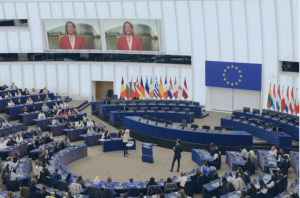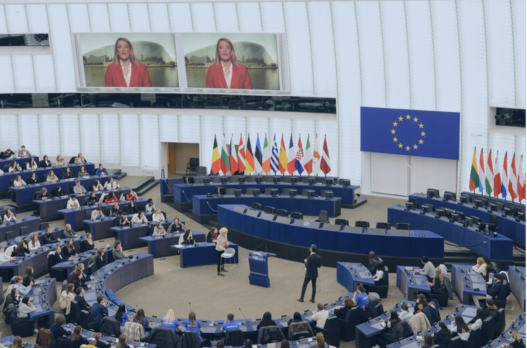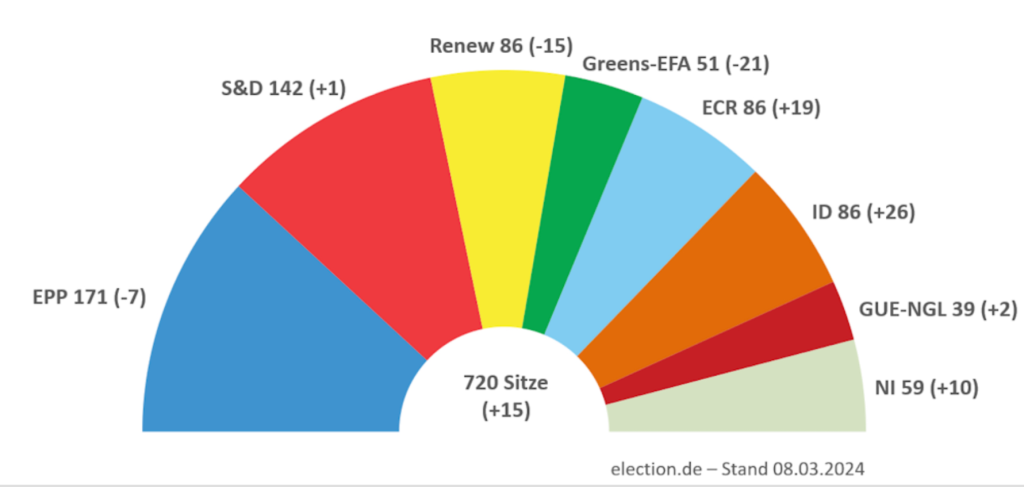
PARLIAMENT GIVES GREEN LIGHT TO WORLD'S FIRST ARTIFICIAL INTELLIGENCE LAW
By Ane Barcos / Aquí Europa
The European Parliament approved Wednesday, March 13, 2024, by a large majority new rules that will ensure that Artificial Intelligence (AI) is trustworthy, safe and respects EU fundamental rights, while supporting innovation.
The regulation, which was agreed in negotiations with member states in December 2023, aims to protect fundamental rights and EU values by ensuring that AI systems placed on the European market and used in the EU are safe.
“Our groundbreaking AI law will allow us to be world leaders in digital and technological innovation on the basis of the EU’s democratic values, because Europe has the capacity to set the standard worldwide (…), responsibly,” said European Parliament President Roberta Metsola.
MEPs backed with 523 votes in favor, 46 against and 49 abstentions, the world’s first AI regulation that sets guidelines for safe, human-based development. “Today is a historic day,” said Internal Market Committee co-rapporteur Brando Benifei.
For his part, Civil Liberties Committee co-rapporteur Dragos Tudorache said that the European Union, through this regulation, has struck a balance between the interest of innovation and the interest of protection.
The legislation establishes the framework for companies that want to continue innovating in Europe, enabling them to do so, but it also guarantees protection, “which we believe is imperative to guarantee the rights of our citizens and our societies, that is, that they can trust this technology and that they can trust the use of these technologies in their lives,” said Tudorache. And he remarked: “I believe that the text we are presenting today combines these two objectives. We have achieved that balance between the interest of innovation and the interest of protection.
PROHIBITIONS AND EXCEPTIONS TO THE REGULATION
The regulation approved by MEPs bans artificial intelligence applications that threaten citizens’ rights, such as biometric categorization and untargeted facial image extraction, as well as emotion recognition in the workplace, social scoring and predictive policing.
The use of biometric identification systems by law enforcement is restricted and subject to strict safeguards. Clear obligations are established for other high-risk AI systems, such as keeping records of use and ensuring human oversight.
In addition, AI systems must meet transparency requirements, and manipulated images must be clearly labeled.
MEASURES TO SUPPORT SMES
The EU plans to establish innovation support measures, including regulated and accessible testing environments for small and medium-sized enterprises (SMEs) and start-ups. This will enable them to develop and train innovative artificial intelligence (AI) technologies before bringing them to market.
The European Parliament adjusted some aspects of the regulation to support startups that lack the resources to meet regulatory requirements. In Tudorache’s words, the AI legislation includes specific provisions for SMEs, such as testbeds that startups and SMEs will be able to access. According to the Liberal co-rapporteur, these elements will facilitate the creation of an environment conducive to innovation, removing obstacles rather than creating them.
THE FUTURE OF THE ARTIFICIAL INTELLIGENCE LAW
The regulation, pending formal endorsement by the European Council, will become fully applicable 24 months after its entry into force, with the exception of some specific provisions: prohibitions on prohibited practices will apply six months after entry into force; codes of practice will be applicable nine months later; general-purpose artificial intelligence rules, including governance, will be implemented 12 months later; and obligations for high-risk systems will be in place within 36 months.
“After the approval of this law, here the important thing will be in those next stages the implementation and accompany that voluntary compliance of companies and institutions,” said Socialist Benifei.
In that sense, he advocated continuing to work on the regulation during the next legislature, proposing more specific regulations such as a directive on the use of artificial intelligence in the workplace.
————
This article was originally published in Aquí Europa, with whose permission we reproduce it.



